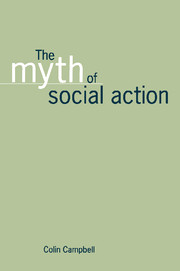Book contents
- Frontmatter
- Contents
- 1 Introduction
- 2 Action reported missing in action theory
- 3 Action and social action
- 4 Action versus social action
- 5 The rise of social situationalism
- 6 The argument by denial
- 7 Accounts and actions
- 8 The argument by exclusion
- 9 The argument through incorporation
- 10 The ‘learning everything from others’ thesis
- 11 The communicative act paradigm
- 12 The linguistic turn for the worse
- 13 The myth of social action
- 14 The obstacle which is social situationalism
- 15 Epilogue: bringing action back in
- Notes
- Bibliography
- Index
11 - The communicative act paradigm
Published online by Cambridge University Press: 07 May 2010
- Frontmatter
- Contents
- 1 Introduction
- 2 Action reported missing in action theory
- 3 Action and social action
- 4 Action versus social action
- 5 The rise of social situationalism
- 6 The argument by denial
- 7 Accounts and actions
- 8 The argument by exclusion
- 9 The argument through incorporation
- 10 The ‘learning everything from others’ thesis
- 11 The communicative act paradigm
- 12 The linguistic turn for the worse
- 13 The myth of social action
- 14 The obstacle which is social situationalism
- 15 Epilogue: bringing action back in
- Notes
- Bibliography
- Index
Summary
We have seen that the ‘all meaning is social’ thesis is the key to that syllogism which is central to the dominant situationalist orthodoxy in sociology and hence, in effect, the principal reason why all action is regarded as if it were indeed social action. Yet, as we have just seen, there are many grounds for believing such a thesis to be implausible. One is bound to ask why in that case it has come to have such a grip over the minds of contemporary sociologists. In part, the answer lies in the fact that this is dogma, now no more than an unquestioned assumption, equivalent in the eyes of many sociologists to the belief that sociology is a discipline which necessarily confines itself to the study of social phenomena. Yet it seems unlikely that such a belief could have gained acceptance within the discipline in the first place unless it had some empirical support; which indeed it does. For there is a certain form of conduct – communicative action – which accords with the situationalist assumptions concerning action in general. Indeed, it is largely because situationalism involves taking such actions as paradigmatic of all human conduct that sociologists have been persuaded to adopt the new orthodoxy. Unfortunately, it is not clear that most human actions are best understood by treating them as if they were forms of communication.
There is little doubt that the main strength of situationalism arises from the dominance accorded to a situationally determined communicative act paradigm.
- Type
- Chapter
- Information
- The Myth of Social Action , pp. 115 - 131Publisher: Cambridge University PressPrint publication year: 1996



